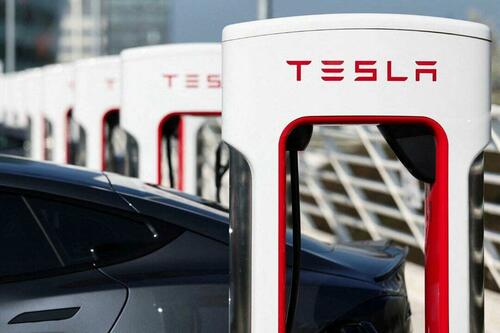Authored by Naveen Athrappully via The Epoch Times (emphasis ours),
Tesla shares responsibility for an accident involving its vehicle’s Autopilot system, and must pay $243 million as compensation, a jury from the District Court, Southern District of Florida, said in an Aug. 1 verdict.
The case stems from a collision involving a 2019 Tesla Model S equipped with automatic driving features, in which Tesla’s Autopilot allowed the car to “navigate without driver input,” according to a June 30 court document.
The incident took place on April 25, 2019, when George McGee, the driver and owner of a 2019 Tesla Model S, slammed into a parked Chevrolet Tahoe, which then went on to strike two individuals—Naibel Benavides Leon and Dillon Angulo. While Leon died in the accident, Angulo suffered “significant injuries.”
Subsequently, Leon’s representative and Angulo filed separate lawsuits against Tesla, which were eventually consolidated into a single lawsuit in March 2024. Out of the four charges laid out in the lawsuit, the court allowed two product liability claims against Tesla to move forward—defective design and failure to warn.
On Aug. 1, a Florida jury agreed that Tesla placed the 2019 Model S in the market “with a defect which was a legal cause of damage” to the victims, according to the verdict form.
They found that there was negligence on the part of driver McGee as well, which was also a legal cause of damage to Leon and Angulo.
Tesla was assigned 33 percent of the accident’s responsibility by the jury, with McGee sharing 67 percent.
Commenting on the verdict, law firm Singleton Schreiber LLP, representing the victims in the lawsuit, said in an Aug. 2 post that the jury “determined that Tesla was 33 percent at fault for allowing Autopilot use on roads it wasn’t designed for and failing to adequately monitor driver attention.”
The jury awarded $35 million to Leon’s mother and $24 million to her father. For Angulo, the jury awarded $70 million in damages. In total, the plaintiffs were awarded $129 million, according to the Aug. 1 verdict.
Since Tesla shared 33 percent of the responsibility, the company is due to pay a third of the $129 million, which comes to around $43 million.
Plus, the jury also imposed a $200 million punitive damage on Tesla, bringing the total to $243 million.
In an emailed statement to The Epoch Times, Tesla criticized the jury’s decision.
“Today’s verdict is wrong and only works to set back automotive safety and jeopardize Tesla’s and the entire industry’s efforts to develop and implement life-saving technology. We plan to appeal given the substantial errors of law and irregularities at trial,” a company spokesperson said.
“Even though this jury found that the driver was overwhelmingly responsible for this tragic accident in 2019, the evidence has always shown that this driver was solely at fault because he was speeding, with his foot on the accelerator—which overrode Autopilot—as he rummaged for his dropped phone without his eyes on the road.”
Tesla said that no car, from 2019 or today, would have been able to prevent the crash.
The company pointed out that the car’s driver had “admitted and accepted responsibility” for the incident since day one.
Tesla said the punitive damages in the case will only amount to $127.5 million, lower than the $200 million mentioned in the jury verdict.
“Florida law is explicit that punitive damages have been all but eliminated in product liability cases such as this one, so we are confident that the punitive damage award at a minimum, and likely this whole verdict, will be overturned by the appellate court,” the company said.
Autopilot Under Scrutiny
The plaintiffs’ lead lawyer, Brett Schreiber, acknowledged that the driver, George McGee, was negligent, but said that Tesla was at fault nonetheless.
He said Tesla allowed drivers to act recklessly by not disengaging the Autopilot as soon as they begin to show signs of distraction, and by allowing them to use the system on smaller roads that it was not designed for, like the one McGee was driving on.
Tesla’s decision to even use the term Autopilot showed it was willing to mislead people and take big risks with their lives because the system only helps drivers with lane changes, slowing a car, and other tasks, falling far short of driving the car itself, he said.
The Epoch Times reached out to the plaintiffs’ attorney for comment and did not receive a response by publication time.
McGee had previously settled with the victims and was cited for careless driving, according to the Aug. 1 post from Singleton Schreiber LLP.
Tesla has faced regulatory scrutiny over the safety of its vehicles.
In April 2024, the Department of Transportation’s National Highway Traffic Safety Administration (NHTSA) said Tesla’s Autopilot system contributed to at least 467 vehicle crashes, including 14 deaths and several serious injuries.
In January, NHTSA announced it was investigating a feature on Tesla vehicles that allows drivers to move their vehicles remotely, via a phone app. The department had received a complaint, alleging that a crash occurred, from a person using this feature.
On its website, Tesla says the Autopilot system is far safer than human drivers.
“In Q2 2025, we recorded one crash for every 6.69 million miles driven in which drivers were using Autopilot technology. For Tesla drivers who were not using Autopilot technology, we recorded one crash for every 963,000 miles driven,” it said.
The company said that setting a vehicle on Autopilot does not mean the driver doesn’t have to pay attention.
“Autopilot is a driver assistance system that is intended to be used only with a fully attentive driver. It does not turn a Tesla into a fully autonomous vehicle. Before enabling Autopilot, you must agree to ‘keep your hands on the steering wheel at all times’ and to always ‘maintain control and responsibility for your vehicle,’” it said.
The Associated Press contributed to this report.
Loading recommendations…


















